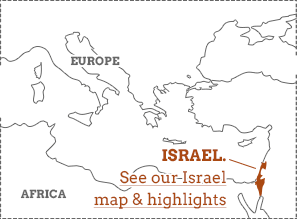A brief history of Israel
Given that the State of Israel was created as recently as 1948, its history is relatively complex and, of course, is still the source of ongoing national and international conflict. The history of the region as a whole goes back as far back as the word ‘ancient’ can possibly be stretched but, for the purposes of this Israel travel guide, we will only look at the state of Israel’s history since its creation.
Nor do we don’t seek to make sense of the Middle East conflict here, but just try to give a quick summary of the chronological events following the creation of the state of Israel. So that, when you visit, you have a good starting point from which to ask more of your own questions, seek answers and make your own opinions.
Read more Early foundations
The foundations of the state were actually laid in 1917, when the British government’s Balfour Declaration declared that a "national home for the Jewish people" was to be founded in Palestine, and this was then formally agreed to by the League of Nations Mandate in 1920. It also declared that the "civil and religious" rights of non-Jewish communities living there were to be respected and preserved. Following the Holocaust of the Second World War, the process of creating this home sped up significantly, with the UN voting to partition Palestine into Jewish and Arab States, but keep Jerusalem under international control, in 1947.
The creation of an independent state of Israel 1948
The state was declared independent in 1948, the British withdrew from their years of presence during the Mandate and fighting broke out between Palestinian Arabs, as well as neighbouring states, as Israelis claimed territories beyond the agreed partitions. An Armistice was agreed in 1949, which gave control of the West Bank and Gaza Strip to Jordan and Egypt. At this time, a vast majority of the Palestinian population left Israeli lands which they still claim to be theirs today.
Six Day War 1967 and occupied territories
But fighting continued, as Palestinian militants were determined to claim back the lands taken, that weren’t agreed during the partition agreements. Israel fought back, leading to two major events. The Sinai Campaign of 1956, when Israel attacked Egypt, now home to Palestinian resistance fighters, and, most devastatingly, the Six Day War of 1967, when Israel showed its military strength against not only Egypt, which had been blockading the crucial port of Eilat, but also Jordan and Syria. Six days later, Israel took control of the Sinai, Gaza, West Bank, Golan Heights and Jerusalem. This led to UN Security Council Resolution 242, which demanded an Israeli withdrawal from"territories occupied in the recent conflict".
1973 October War with Egypt for Sinai
Pulling back to the internationally agreed borders of Israel was not to happen, however, until the 1973 October War which was when Egypt fought back, across the Suez Canal, to claim back the Sinai. Although defeated by strong Israeli air power, a peace agreement was reached in 1977, and Israel handed back the Sinai to Egypt in 1979.
Lebanon War 1982
From war with Egypt to war with Lebanon, where more Palestinians guerrillas were based, now led by Yasser Arafat and the Palestine Liberation Organisation, which did not recognize Israel and its enforced borders. Israel invaded Lebanon in 1982, to great international condemnation. Eventually Israeli troops withdrew, but a bloody civil war continued as a result in Lebanon, lasting until 1990.
Infitadas and Oslo Agreement
A Palestinian uprising, known as an ‘infitada’ took place in 1987, as Israeli authorities continued to spread into Palestinian territories, leading to more and more unrest. Finally, hope for peace was seen by the world in 1993 when Prime Minister of Israel, Yitzhak Rabin, and the PLO leader, Yasser Arafat, agreed a peace deal known as the Oslo Agreement at the USA’s White House. They negotiated the Israeli withdrawal from territory captured in the 1967 War as well as the creation of a Palestinian Authority. Peace did not reign, however, as extremists on the ground disagreed with the decisions made, considering them a sell out, and kept up violent backlashes. This led to a second infitada in 2000 at which point Israel re-occupied the West Bank, and started the construction of the infamous Separation Wall/West Bank Barrier/Apartheid Wall along the West Bank to protect itself from suicide bombings, although seen by many as another step in creating another border, preventing free movement of Palestinian people. Still being constructed today, when it is complete, its total length will be about 700km.
Removal from Gaza Strip.
Meanwhile, more international negotiations led to Israel’s withdrawal from the occupied Gaza Strip in 2005, which may have felt like one step forward towards peace. However, a year later Israel entered a 33 day war with Lebanon, this time over attacks made by Hezbollah, a Shi'a Islamist militant group and political party based there. And meanwhile, nearly fifty years since Israel occupied territories against international advice, the wall continues to grow, the borders remain in question and lives are still being lost.


